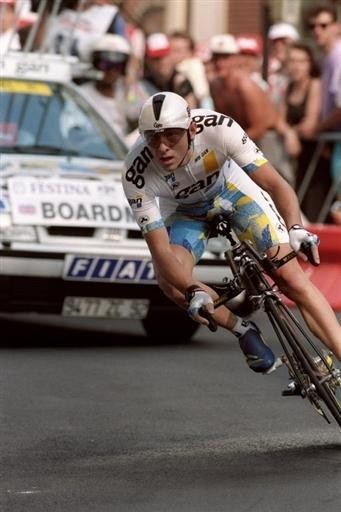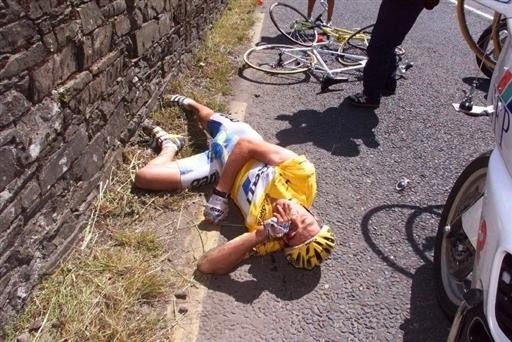The shortest Tour de France ever
It's about as far as you can ride in 90 seconds if you're going very quickly. The proper Tour of...


Tales from the peloton, May 15, 2008
The most persistently unsuccessful Tour de France rider in the world is a man called Georges Goffin. He came from Liège, in French-speaking Belgium, and sometimes for reasons unknown he called himself Georges Nemo. Nemo is Latin for "no one". Maybe that's how he preferred to be remembered, because his unfortunate record is that he started the Tour de France three times and abandoned all of them on the first day. It's a record not likely to be matched, but as Les Woodland recalls, the record for the shortest participation ever in a single Tour is held by Chris Boardman.
It's about as far as you can ride in 90 seconds if you're going very quickly. The proper Tour of 1995 hadn't even started because this was just the prologue. Boardman came down a shallow hill in St-Brieuc, slid painfully into a barrier as he tried to take a bend, fell off, nearly got run over by his team car, got up, started riding again, then called it a day.
The French historian Jean-Paul Ollivier wrote: "Storms flooded Brittany. The British rider came out of the start ramp like a rocket, took two or three bends at the very limit - a true acrobat - and went without limit through a wider bend. Propelled by his rare strength, his back wheel lifted into the air, hitting the barrier on the right of the road. Roger Legeay, who was following him by car, barely managed to miss him. Tally: several breaks to an ankle, cuts to his forearm, multiple bruises. Before it had even started, the Tour was finished without him."
The operation to put him right took two hours.
Cynics who said that no good ever came out of riders from the ride-at-dawn lone vice of British time trialling - Boardman's background - polished up their prejudices two years later. Then, Boardman won the prologue but crashed going down the Col de Soulor on the 13th stage and left for home on the way to the Alpe d'Huez after struggling in the time trial. By now he was being seen, as with Ernest Worthing and the loss of his two parents, as "careless". Ten years ago this summer he once more rode the Tour, won the prologue... and crashed two days later.
As it happens, hardly anybody remembers now. While Boardman and the rest of the Tour were in Ireland for the first stages, news was already arriving that a soigneur for the Festina team had been halted on his way into France and his car relieved of embarrassingly large quantities of drugs. The subsequent scandal grew so big, almost ending the Tour, that folk are hard-pressed to think now who won, still more to remember what happened to Boardman. The 1998 Festina Affair overwhelmed it all.
Get The Leadout Newsletter
The latest race content, interviews, features, reviews and expert buying guides, direct to your inbox!
What did happen was that Boardman won the prologue and kept his yellow jersey next day as the field let the sprinters fight their private wars. Another mass sprint was expected next day, on the way from Enniscorthy to Cork, but 50km before then there was a bonus prime in the town of Youghal. The sprinters needed it for their prestige and the other contenders wanted it for the few seconds that could put them in yellow. That especially interested the German sprinter, Erik Zabel, and the French rider, Frédéric Moncassin. Boardman saw both as a threat and took up position behind Moncassin and the Belgian, Johan Bruyneel, about two dozen places back from the front.
The bunch spread into a line. Nobody knows what happens next. Not even Boardman, because they picked him up off the road with his mind a blank. The most likely explanation is that he touched Moncassin's wheel, but Moncassin doesn't recall anything unusual. Except that, at that speed, everything is unusual. Others say that it was Bruyneel who brought him down. Nobody knows.
Boardman ended up against a wall, unconscious. The first worry was that he had hit his head. When after three minutes he came round, they picked him up, stared into his eyes a lot, felt him all over, asked unsuccessfully what had happened, then took him off to hospital with what looked like - but wasn't - a broken jaw. Like Rolf Sorensen in 1991, like Chris Boardman in 1995, Chris Boardman said farewell to the Tour de France with a yellow jersey on his shoulders, the 13th maillot jaune to do so.
Erik Zabel took his place in yellow.
Other than the date there was no significance, but journalists were quick to note that precisely 30 years earlier, to the day, another British rider had also left the Tour. That time it was the very first Briton to wear the yellow jersey: on Friday, July 13, 1967, Tom Simpson died on Mont Ventoux.
It was because drugs were involved in Simpson's death that the British magazine, Cycling, denied to make Simpson its rider of the century, choosing Boardman instead. On the road, Simpson did far more than Boardman. His death was a tragedy. Boardman's tragedy was that on the road he never did what his talent had given him.